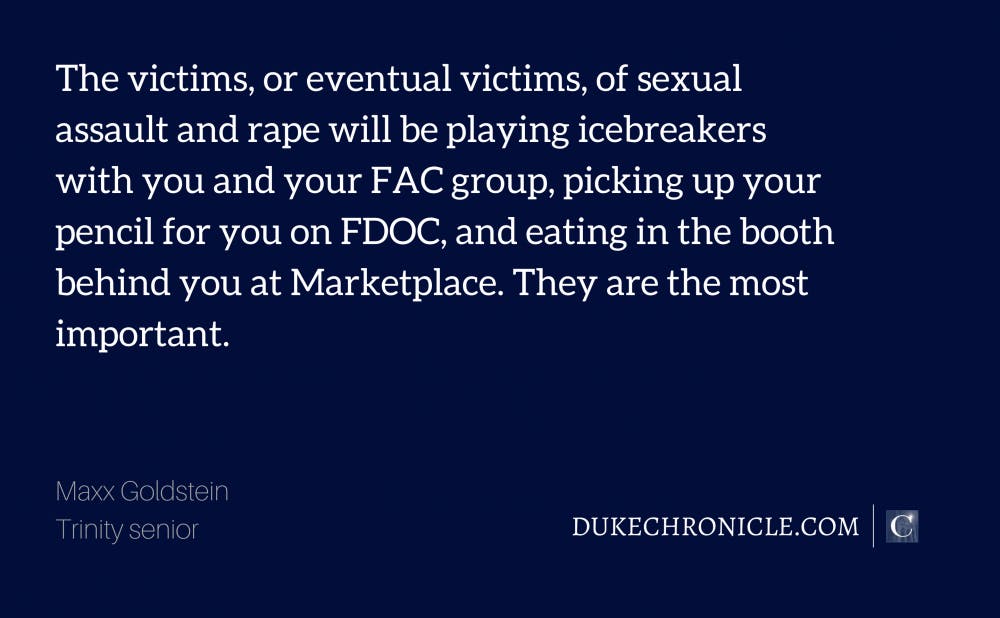Dear Duke Freshman Boy,
Sexual assault is not only one of the most harmful actions committed on Duke’s campus, but it is also one of the most frequent.
As one of many Duke students who did not understand the pervasive nature of sexual assault when I came to college, education on the subject has taken time. I am writing this column in an effort to start the discussion earlier, particularly for freshmen and sophomores at Duke, whose awareness could protect victims and prevent rape.
Nationally, according to the National Sexual Violence Resource Center, about one in five women are “victims of forced sex” in college. However, just one in ten women report the crime. At Duke, these statistics are twice as horrific—two in five undergraduate women report having been sexually assaulted during their time here.
What is sexual assault? What is rape?
It may seem strange to define these terms. However, without looking them in the face, it is impossible to combat the problem. Per Merriam-Webster, sexual assault is “illegal sexual contact that usually involves force upon a person without consent or is inflicted upon a person who is incapable of giving consent (as because of age or physical or mental incapacity).” Rape is “unlawful sexual activity and usually sexual intercourse carried out forcibly or under threat of injury against a person's will or with a person who is beneath a certain age or incapable of valid consent because of mental illness, mental deficiency, intoxication, unconsciousness, or deception.”
If these definitions read as nebulous, then you are the individual this article is written for. If these definitions read as inconceivable, then you are the individual this article is written for.
The importance in including these definitions is to bridge the gap between viewing sexual assault and rape as too immoral to seem tangible and viewing them more objectively: understanding that many of your classmates for your first Duke classes will become the perpetrators and victims of such actions.
What about you?
If you’re a girl who feels comfortable enough to socialize at this university, you are in the most danger during your first semester -- the “Red Zone.” This refers to a freshman’s first six weeks at college, when, according to RAINN, 50 percent of campus sexual assaults occur.
If you’re a guy who’s just starting out at Duke, you might be entirely oblivious to the dangerous reality your female peers will be facing this semester. You will be too caught up in your classes and impressing older kids to realize. Moreover, nobody will tell you about assault for at least a year, because the female victims of these attacks don’t want you to remember them as "the girl who got raped." You may hear about one or two questionable instances during your sophomore year, but you won’t ask more questions because Duke has treated you well, so why would it not treat anyone else well? Then you’ll go abroad, and when you come back you’ll look at things more critically. In doing so your eyes might open to the reality that your close girl friends struggle with at Duke. By the end of junior year you’ve only just been able to wrap your head around its severity. And, by senior year, you are too checked out to do anything about what you’ve learned, and too self-centered because of the pedestal you’re on (which, by the way, you’ve done nothing to earn), to care about the health of the teenagers you meet at your O-week darty. You are the perpetrator.
So What?
The victims, or eventual victims, of sexual assault and rape will be playing icebreakers with you and your FAC group, picking up your pencil for you on FDOC, and eating in the booth behind you at Marketplace. They are the most important. If you cannot see them as sisters of your shared community, you will not treat them as such.
The reason this problem persists is a failure to care for another as you do for yourself. This is why the point at which Duke boys begin to understand sexual assault comes as their relationships with their girl friends at Duke deepens—they begin to care for their female peers like they would their sister.
I challenge you to show this respect from day one, and hold your “bros” accountable in the same way. Over my time at Duke I have watched this topic of conversation surface at a younger and younger stage for Duke students. On one hand, this represent proactivity and progress. On another hand, this represents severity and necessity.
It is my sincere hope that by the time you, freshmen boy, are graduating, you could not write this same article.
With hope,
Duke Senior Boy
Get The Chronicle straight to your inbox
Signup for our weekly newsletter. Cancel at any time.

